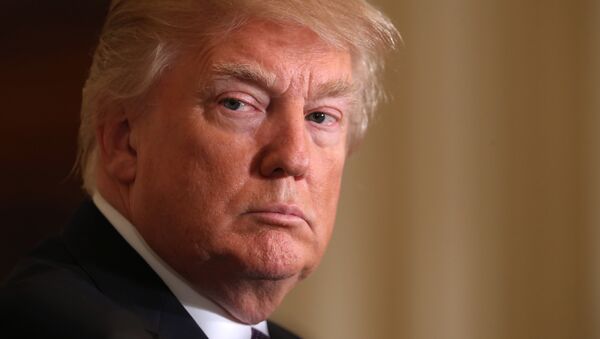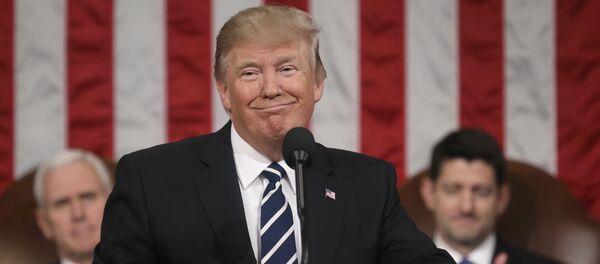Kristian Rouz — This outgoing week went by under the 'economic nationalism' moniker in the White House rhetoric and executive action, with President Donald Trump scrutinizing US foreign trade and employment of overseas workers. However, visible disagreements are mounting between the Trump administration and Congress Republicans over the planned tax reform and financial sector deregulation — where the GOP are willing to go all the way, the President has, surprisingly, a more balanced and inclusive approach to the policies discussed.
During the 'economic nationalism week' in the White House, President Trump signed executive orders on US manufacturing, hiring overseas workers, and US foreign trade. Several federal agencies will spend the upcoming months collecting data, which will lay the groundwork for the comprehensive economic reform, which, Trump said, is designed to "defend our workers, protect our jobs and finally put America first."
Nonetheless, the impending reform itself is the point of potentially severe disagreements between Trump and Congress Republicans. The White House are still uncertain over the 'border adjustment tax' proposal, put forth by the House Speaker Paul Ryan — in other words, Trump and his advisors are still considering the possible pros and cons of hiking imports tariffs.
Next week, Trump will release his plan for individual and business income tax cuts, and yet, as White House sources suggested, the final legislation will likely not include all its initial provisions.
"We'll be having a big announcement on Wednesday having to do with tax reform. The process has begun long ago, but it really formally begins on Wednesday," Trump said during his visit to the US Treasury Department.
The upcoming fiscal reform will likely not be quite as radical as some observers had expected previously. Ryan's proposal was to substitute the 35-percent corporate income tax with a 20-percent ‘border adjustment tax', with imports and domestic sales of US enterprises taxed at a flat rate. Exports would be tax-exempt, under Ryan's proposal.
"We're trying to backfill from there," White House Budget Director Mick Mulvaney said.
This is mainly due to the complaints from oil refiners, car producers and retailers. Under Ryan's proposal, US oil prices would skyrocket: many US refiners are heavily dependent on imported crude, and whilst US drilling would robustly rebound due to the expected spike in oil prices, the White House would like rule out any economic shocks such as, for example, a one-time spike in petrol prices at the filling stations.
Another concern is, at this point, many US carmakers are producing cars oversea and importing them into the US. A one-time increase of imports tariff by 20 percent would essentially be a shock given this practice and would be passed on to the consumers in the form of increased car prices, not to mention many other manufactured consumer goods.
"Deficits are not driving the discussion," Mulvaney said.
Which means what Trump will announce next week will likely be a diluted version of what the Congress GOP proposed. According to some reports leaked from the White House, Trump's plan will include massive tax cuts for businesses and individuals. A hike in customs tariffs will likely take longer to coordinate, resulting in a milder increase to somewhere between zero and the aforementioned 20 percent cap.
"The President was saying what we've been saying all along, that he wants to do tax reform as quickly as possible while still doing it right," White House officials said.
This might be an indication of Trump's willingness to sweeten the pill of the reform for the Democrats and other critics by toning it down. A lower border tax — or a delay with hiking imports tariffs — would allow the White House to cut taxes with less opposition and political tension.
However, the GOP might block Trump's tax cuts because they see the proposed immediate hike in customs tariffs as a measure which would finance Trump's ambitious spending goals without going deeper into debt. For the GOP, the so-called ‘revenue neutrality' is crucial — after eight years of Obama in the office, the Republicans, who now control both the House and the Senate, are very frugal when it comes to spending.
For each penny spent by Trump, they want a penny in new budget revenues. Reaching a mutually-satisfactory solution will be hard for both Trump and the GOP.
Another concern is that Trump might ultimately abandon his plans for a tax reform in favor of temporary tax cuts. The pressure from Congress Republicans in favor of a comprehensive reform, however, will be significant, meaning the likeliest outcome, as negotiated by the White House and Congress, would be not-so-massive tax cuts and a not-so-significant increase in imports tariffs, implemented gradually over several years.




